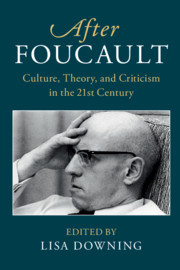Book contents
2 - Foucault's Subjectivities
from PART I - GOING AFTER FOUCAULT
Published online by Cambridge University Press: 30 May 2018
Summary
I don't feel that it is necessary to know exactly what I am. The main interest in life and work is to become someone else that you were not in the beginning.
Michel Foucault, ‘Truth, power, self’Introduction: Inheriting Foucault, Again
How to inherit Foucault? To take up the challenge of thinking the concept of subjectivity after Foucault is, first of all, to recognize that while his work remains widely debated, reinterpreted, and often critiqued, it has constituted a veritable event in the history of modern thought, in the sense of marking the difference between a ‘before’ and an ‘after’. His analyses wrested the concept of subjectivity from the dominant problematics in which it had been hitherto situated, transformed its trajectory, and reinvented the problems to which it may constitute a response. Stated in the broadest terms, Foucault proposed a genealogy of subjectivity in explicit contrast to the project of developing a philosophy of the subject as ‘the foundation for all knowledge and the principle of all signification’. This move reversed the relation that had traditionally been posited between subjectivity and the possibility of knowledge. Thereafter, subjectivity became intelligible as the product, rather than the origin, of historically specific concepts and theories embedded in the working of normative institutions. Beyond this, as we will go on to argue, Foucault's engagement with the problem of subjectivity effected an even more profound displacement, by historicizing the privilege of knowledge (and scientific knowledge in particular) as a modality of relation to the truth in the constitution of human beings as subjects. It is in light of these profound displacements that engaging with the concept of subjectivity in modern thought today – whether to endorse, interpret, criticize, or transform it – is to become, directly or indirectly, faithfully or unfaithfully, Foucault's heirs. Our aim in this chapter is to explore what inheriting Foucault may involve, what it may demand of those who think and write about subjectivity after him.
And yet, have we not inherited Foucault already? Have we not already learned the lessons that stemmed from his historical and philosophical inquiries into subjectivity?
- Type
- Chapter
- Information
- After FoucaultCulture, Theory, and Criticism in the 21st Century, pp. 31 - 45Publisher: Cambridge University PressPrint publication year: 2018
- 2
- Cited by

